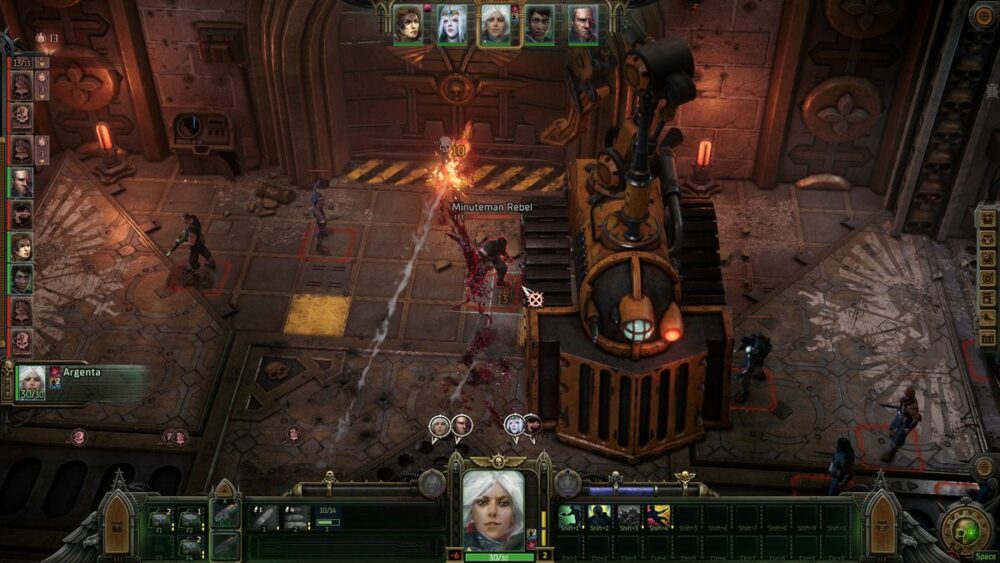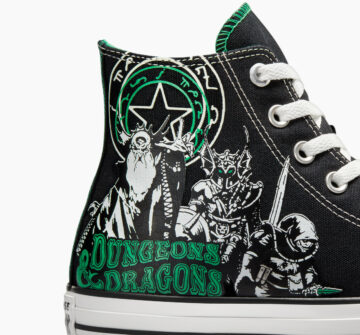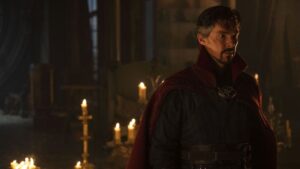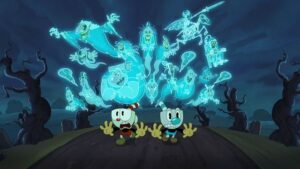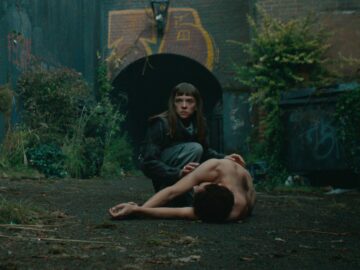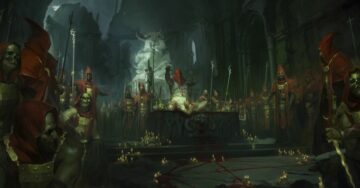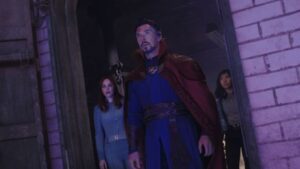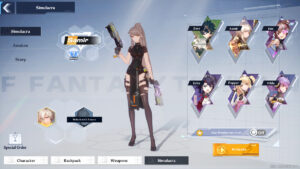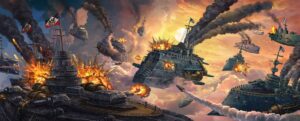Games Workshop retail staff have a rough job, from low pay to consistent unreasonable targets from upper management, so it’s with all the love and respect that I tell you about the animated lad that my 14-year-old friends and I used to make fun of for liberal use of the phrase “If a Space Marine walked in here right now…” It was always accompanied by wildly enthusiastic gesticulation meant to convey the absolute unit-tude of said Space Marines (8 feet tall in Warhammer 40,000’s lore). I bring this up because it perfectly sums up the thorny issue behind marketing these yoked stormtroopers: Space Marines are very expensive for something so small, forcing Games Workshop to make the legend of these tiny plastic soldiers tower over the reality.
And what a legend it is. The Horus Heresy book series currently consists of over 60 fat paperbacks worth of lore. There’s far too much nuance to unpack here, but it’s fair to say that when writers spend that long exploring something, they have to take it quite seriously, especially if they want to keep their readers hooked. To be clear, 40K is a fascinating, fun, creative, vast, and often extremely clever setting. But it’s also — at least as recently as 2021, according to its parent company — explicitly, intentionally satirizing the very faction that the vast majority of its lore seems so fascinated with. “Satire is people as they are; romanticism, people as they would like to be,” wrote the novelist Dawn Powell. As 40K grows and grows, it’s becoming more difficult to deny that the portrayal of the Imperium is at least somewhat aspirational.
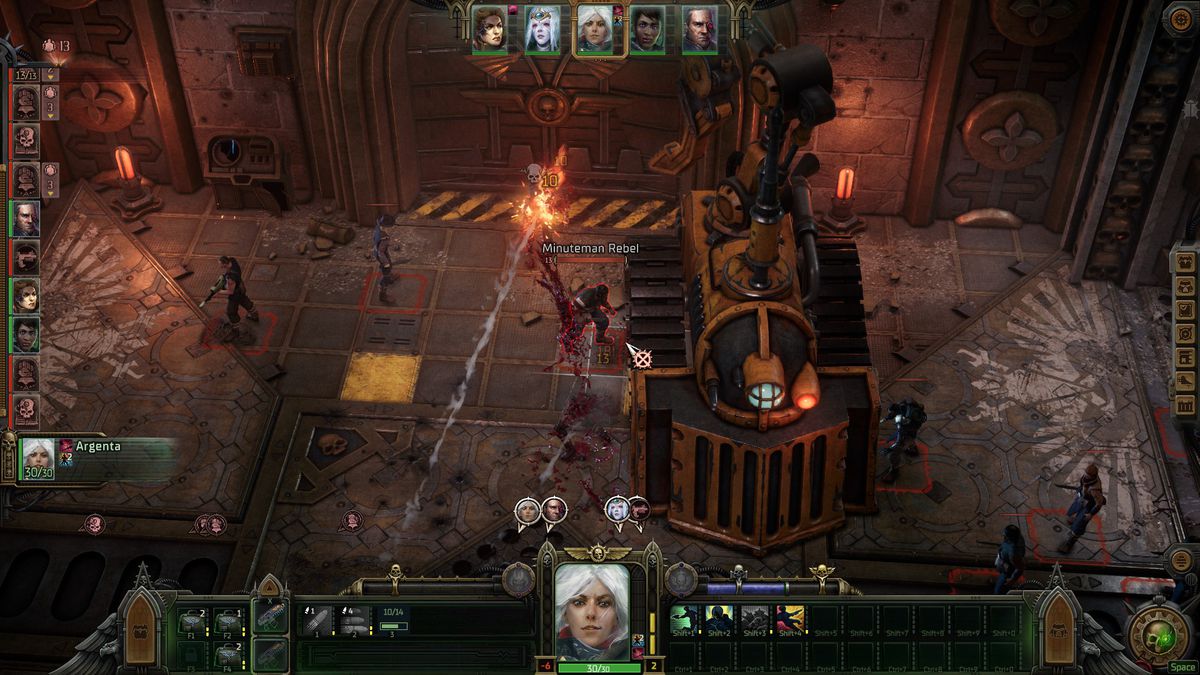
A quick primer: Humanity’s overwhelming presence in the 40K setting takes the shape of the Imperium of Man, where staunch xenophobia, mindless zealotry, and outright hostility toward social or technological progress are among the highest virtues — a literal “cult of tradition”. Ordinary folk live in cramped “Hives,” toiling away until death, at which point they’re repurposed as tasty, nutritious “corpse starch.” The Imperial Guard, humanity’s most numerous military force, is best known for employing the Zapp Brannigan maneuver, i.e., throwing endless bodies at a problem until it sorts itself out. As such, individual human life is less than worthless. Terra’s more elite military are the Space Marines. As 2000 AD’s Judge Dredd is to law enforcement, so are the Space Marines to the concept of the Ubermensch — a grimly satirical warning about the pursuit of perceived physical perfection and ultimate strength.
Of the 36 playable factions in 40K, around half (17) are of the Imperium in some capacity, with a further nine being their direct foil in Chaos, leaving just 10 to split between the multiple nonhuman species that populate this mind-bogglingly huge universe. Sci-fi can vary wildly in flavor, but a unifying thread is that great science fiction is almost insatiably curious. 40K absolutely shines when it mocks the staunch anti-curiosity of its human protagonists. But as the company has gradually grown to value sales over artistic intent, that lack of curiosity too often seems to be adopted by Games Workshop itself.
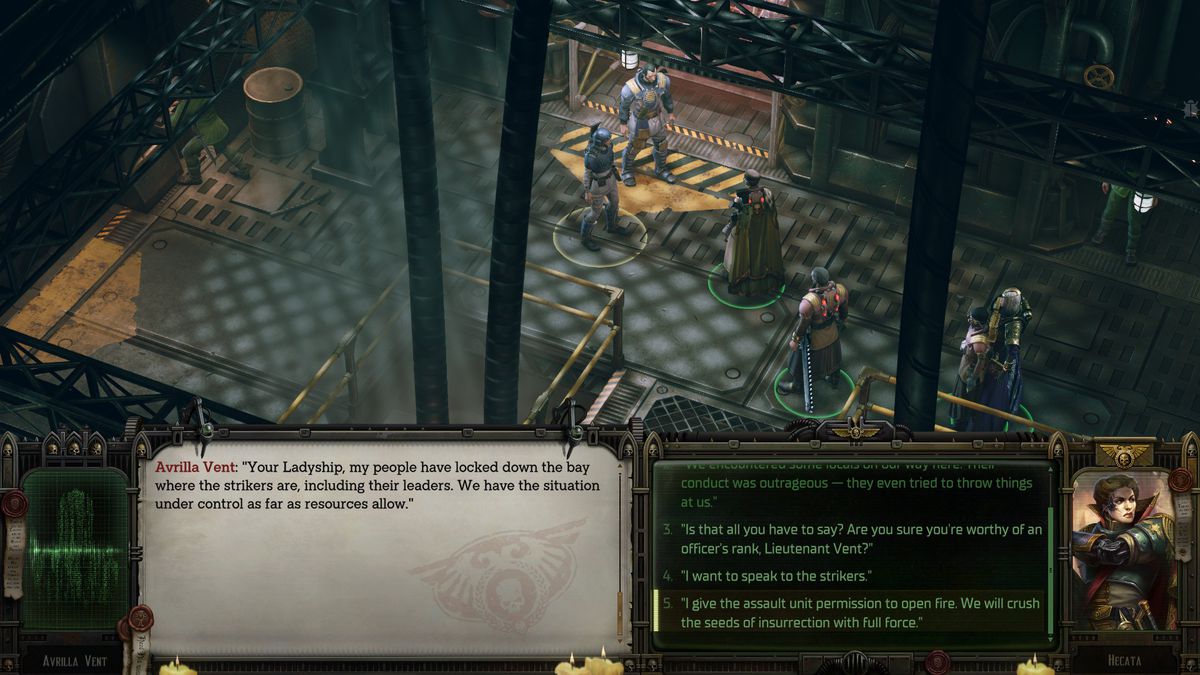
This fantastic look at the timeline of 40K, and how it moved from satire to something almost resembling celebration, puts it like this: “As the setting grew more mainstream, Space Marines’ [portrayal] as noble warrior monks became more and more prominent, resulting in a world where these abused, intolerant, mass-murdering child soldiers are only ever portrayed from the Imperium’s point of view,” and, in the vast majority of official artwork, “as genuine heroes.” Even the official website categorizes nonhuman armies as “the Xenos threat.” Look a little closer, and it’s easy to see the inherent satire in images of Primarch Roboute Guilliman with a Christ-like halo of light shining from the background. But unless you know what you’re looking for, this stuff looks suspiciously like the very propaganda that it’s making fun of.
This isn’t to say, of course, that modern-day Games Workshop has lost its sense of satire, and most certainly not its sense of humor. As we’ve seen time and time again in the games industry, shareholders misunderstanding or just straight-up not valuing the creative process is a depressingly prevailing theme — it’s easy for nuance to get crushed under the pursuit of easy profitability. The rule of cool sells plastic, not difficult themes. Plus, 40K is a wargame. In a setting that requires constant conflict, factions that think in absolutes become necessary. But that’s where video games like the recent, excellent CRPG Warhammer 40,000: Rogue Trader come in. It’d be a massive anticlimax to end a game of 40K with a conversation before it even starts, but as the setting is allowed to spread its wings in a new genre, some of that classic satire begins to flourish again.
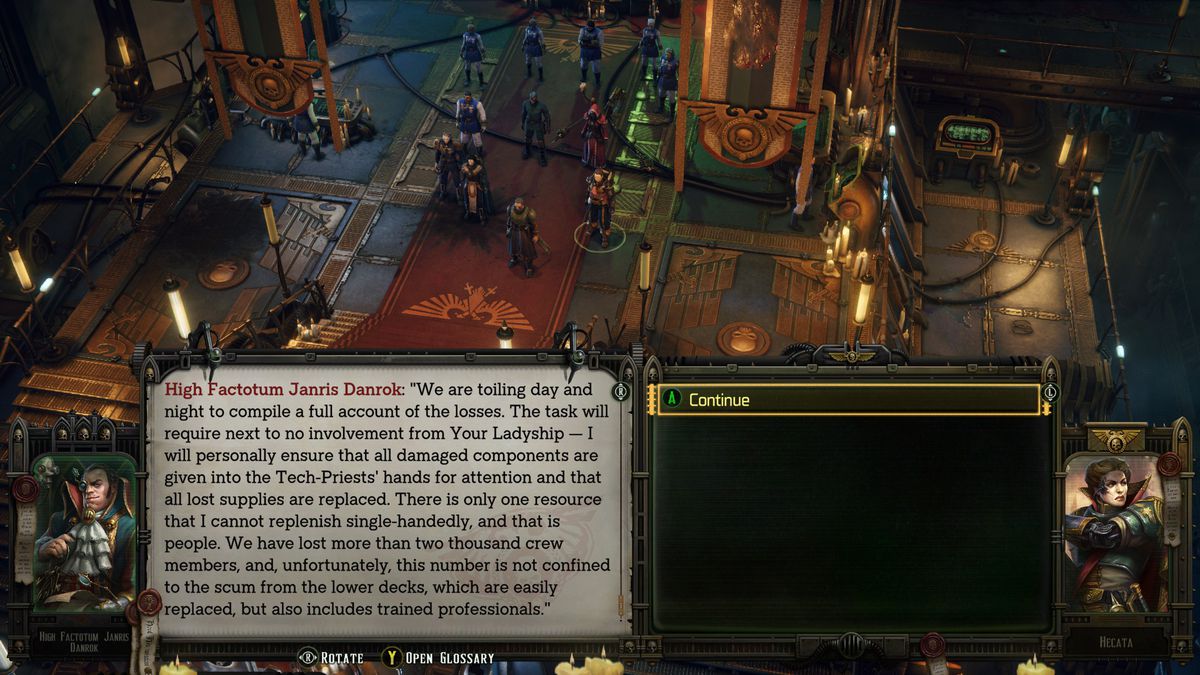
40K is, above all else, ridiculous, and Rogue Trader has fun with it without losing any of the campy grindhouse stuff that grimdark excels at. Characters speak in rich, baroque prose, at once excellently written and almost indecipherable to anyone not already indoctrinated into their bizarre religious neo-feudalism. You don’t even have to leave your own ship to encounter dehumanizing class structure, and each of your erstwhile associates is comically nefarious enough to be the main villain in any other setting. In Baldur’s Gate 3, for example, the evil path requires a deliberate, long attempt to stray into monstrous territory. Here, you can have several crew members executed in the first few hours without breaking character.
Rogue Trader isn’t even the first game to pull this off recently. Warhammer 40,000: Darktide, despite a rocky launch, is shaping up as an excellent successor to the Vermintide series, and portrays the horrific satire of existence in 40K’s horrendous hive cities masterfully. Loading screen quotes are such pointed satire you’d have to have accidentally super-glued your eyes shut building models to miss them, with lines like “A small mind is a tidy mind,” “Blessed are the intolerant,” and “Duty is vital, understanding is not.” It seemed only a few short years ago that the glut of Warhammer games felt like a punchline. Now, the scope and breadth these games offer are starting to feel like a better medium to portray the most complete version of 40K than the tabletop game itself.
- SEO Powered Content & PR Distribution. Get Amplified Today.
- PlatoData.Network Vertical Generative Ai. Empower Yourself. Access Here.
- PlatoAiStream. Web3 Intelligence. Knowledge Amplified. Access Here.
- PlatoESG. Carbon, CleanTech, Energy, Environment, Solar, Waste Management. Access Here.
- PlatoHealth. Biotech and Clinical Trials Intelligence. Access Here.
- Source: https://www.polygon.com/23993946/warhammer-40k-rogue-trader-crpg-plot-characters
- 000
- 1
- 10
- 17
- 2021
- 210
- 212
- 220
- 28
- 40
- 60
- 7
- 8
- 9
- a
- About
- above
- Absolute
- absolutely
- accompanied
- according
- adopted
- again
- ago
- All
- allowed
- almost
- already
- also
- always
- among
- an
- and
- animated
- any
- anyone
- ARE
- around
- artistic
- artwork
- as
- associates
- At
- attempt
- away
- background
- Battle
- BE
- became
- because
- become
- becoming
- before
- behind
- being
- BEST
- Better
- between
- bodies
- book
- breadth
- Breaking
- breaks
- bring
- Building
- but
- by
- CAN
- Capacity
- celebration
- certainly
- chaos
- character
- characters
- child
- Cities
- class
- Classic
- clear
- closer
- come
- company
- complete
- concept
- conflict
- consistent
- consists
- constant
- Conversation
- cool
- course
- Creative
- Crew
- Curiosity
- Curious
- currently
- deal
- death
- despite
- dialogue
- difficult
- direct
- e
- each
- easy
- elite
- else
- employing
- end
- Endless
- enforcement
- enough
- enthusiastic
- especially
- even
- EVER
- Example
- executed
- existence
- expensive
- explicitly
- Exploring
- extremely
- eyes
- fair
- far
- fascinating
- feel
- Feet
- felt
- few
- Fiction
- First
- flourish
- foil
- For
- force
- forcing
- Friends
- from
- fun
- further
- game
- Games
- Games Industry
- Games Like
- Gaming
- gate
- Genre
- genuine
- Get
- gradually
- great
- grew
- grown
- grows
- guard
- half
- Hall
- Halo
- has
- Have
- her
- here
- heroes
- highest
- Hive
- horrific
- hours
- How
- How To
- http
- HTTPS
- huge
- human
- Humor
- i
- if
- Images
- in
- individual
- industry
- inherent
- intent
- into
- Is
- issue
- IT
- ITS
- itself
- Job
- jpg
- judge
- just
- keep
- know
- known
- lack
- launch
- Law
- law enforcement
- least
- leave
- leaving
- less
- Life
- light
- like
- lines
- literal
- Little
- Live
- loading
- Long
- Look
- looking
- looks
- losing
- love
- Low
- main
- Mainstream
- Majority
- make
- Making
- man
- management
- marine
- Marketing
- massive
- meant
- medium
- Members
- Military
- mind
- miss
- misunderstanding
- models
- more
- most
- moved
- much
- multiple
- my
- necessary
- New
- Newsletter
- Nine
- not
- notes
- now
- numerous
- of
- off
- offer
- official
- often
- on
- once
- only
- Options
- or
- Other
- out
- outright
- over
- overwhelming
- Owlcat Games
- own
- Party
- Patch
- patch notes
- path
- Pay
- People
- perceived
- perfect
- perfection
- perfectly
- physical
- plastic
- plato
- plato data intelligence
- platodata
- platogaming
- Plus
- Point
- Point of View
- Polygon
- portrays
- Powell
- presence
- primer
- Problem
- Process
- profitability
- Progress
- prominent
- Propaganda
- pursuit
- quick
- quite
- quotes
- ranking
- readers
- Reality
- Rebellion
- recent
- recently
- Regarding
- requires
- resembling
- respect
- resulting
- retail
- rich
- right
- Rocky
- Rogue
- roundup
- Rule
- Said
- sales
- satire
- say
- Sci-Fi
- Science
- science fiction
- scope
- Screen
- see
- seemed
- seems
- seen
- sells
- sense
- Series
- seriously
- setting
- several
- shape
- shaping
- shareholders
- shines
- Short
- shut
- sign
- small
- So
- Social
- some
- something
- somewhat
- Space
- speak
- spend
- split
- spread
- staff
- Starting
- starts
- Stray
- strength
- structure
- such
- sums
- Tabletop
- Take
- takes
- targets
- Technological
- tell
- territory
- than
- that
- The
- their
- Them
- theme
- themes
- These
- they
- things
- think
- this
- threat
- time
- timeline
- to
- To Leave
- too
- toward
- trader
- ultimate
- under
- understanding
- universe
- until
- up
- upper
- use
- used
- value
- vast
- vehicle
- version
- very
- via
- Video
- video games
- View
- vital
- W3
- want
- Warhammer
- Warhammer 40
- Warhammer 40K
- Warhammer 40K: Rogue Trader
- warning
- Warrior
- was
- Website
- weekly
- What
- when
- where
- Wikipedia
- with
- without
- Workshop
- world
- worth
- would
- writers
- written
- wrote
- XML
- years
- you
- your
- youtube
- zephyrnet
